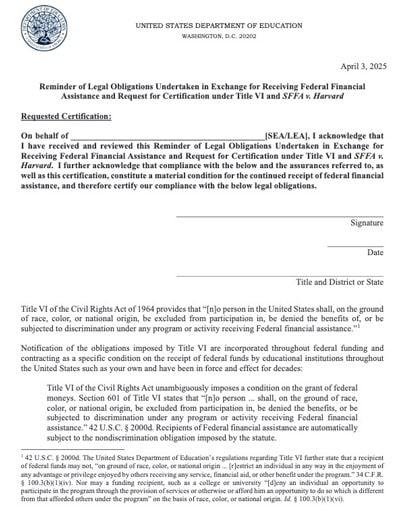Federal Mandate Pressures States on DEI Program Bans in Schools Amid Funding Risks
Federal Directive Forces States to Confirm DEI Program Restrictions Under Threat of Funding Cuts
The U.S. Department of Education has issued a stringent order requiring all states to verify whether their public schools have eliminated or prohibited diversity, equity, and inclusion (DEI) initiatives. This directive carries the significant consequence of withholding federal education funds from states that fail to comply. The mandate intensifies the contentious national discourse surrounding DEI efforts in education, placing the federal government at the forefront of shaping how issues of race, gender, and equity are addressed in classrooms nationwide.
Highlights of the federal directive include:
- Mandatory certification confirming the removal or ban of DEI programs within school curricula
- Submission of detailed documentation outlining policy changes by a specified deadline
- Potential suspension of Title I and other federal funding streams for districts that do not comply
| State | Certification Status | Funding Consequence |
|---|---|---|
| Texas | Certified | Funding secured |
| California | Pending | Funding at risk |
| Florida | Certified | Funding secured |
| New York | Pending | Funding at risk |
Impact on School Districts and Local Education Authorities Amid DEI Policy Shifts
Local Education Authorities (LEAs) and school districts are now under intense pressure to adjust their DEI programs to comply with state-level mandates influenced by the federal directive. The requirement to certify the absence of DEI initiatives places schools in a precarious position, where continued access to essential federal funding depends on adherence to these new policies. Many districts are compelled to reassess or even dismantle existing diversity and inclusion efforts, which could disrupt ongoing educational projects and affect teachers who have integrated DEI principles into their pedagogy.
Administrators must also manage the complex dynamics of community opinions, which are often sharply divided on the role of DEI in education. The consequences of non-compliance extend beyond funding, potentially impacting student support services and community relations. Key challenges include:
- Reallocation of resources from DEI initiatives to compliance and reporting activities
- Increased administrative burdens due to enhanced oversight and documentation requirements
- Potential negative effects on programs designed to support marginalized student populations
- Heightened need for community engagement to navigate polarized viewpoints
To maintain trust and transparency, LEAs and districts must proactively communicate their strategies and decisions, fostering open dialogue with stakeholders during this period of policy transition.
State-Level Legal Resistance and Strategic Responses to Federal DEI Ban Enforcement
In reaction to the Department of Education’s mandate, several states have launched robust legal challenges, asserting that the federal government’s directive infringes upon state sovereignty and constitutional protections, including the First and Tenth Amendments. These states argue that the federal requirement to certify DEI bans undermines local control over educational content and conflicts with community values.
To counteract the federal pressure, states opposing the DEI bans have adopted a multifaceted approach involving:
- Seeking injunctions to delay or block the enforcement of certification requirements during ongoing court proceedings
- Enacting state legislation designed to safeguard local curriculum decisions from federal interference
- Launching public outreach campaigns aimed at raising awareness and rallying community support against perceived federal overreach
| State | Legal or Legislative Action | Current Status |
|---|---|---|
| California | Motion for injunction filed | Pending |
| Texas | State law enacted to protect curriculum autonomy | Active |
| New York | Community education and advocacy campaigns launched | Ongoing |
Guidance for Schools Balancing Federal Compliance and Community Engagement
Schools are navigating a challenging environment as they strive to meet federal certification requirements while addressing the diverse perspectives of their communities. To effectively manage this, educational leaders are advised to implement transparent and inclusive communication strategies. This includes clearly explaining how federal mandates intersect with local policies and actively involving parents, educators, and students in meaningful conversations. Such engagement can help bridge divides and foster a collaborative atmosphere.
Recommended actions for schools include:
- Forming advisory committees that encompass a broad spectrum of community voices
- Distributing accessible educational materials that clarify federal requirements and their objectives
- Organizing regular community forums to gather input and address concerns promptly
By adopting these approaches, schools can not only comply with federal expectations but also strengthen community trust and minimize disruptions caused by contentious debates.
| Approach | Objective | Expected Result |
|---|---|---|
| Advisory Committees | Engage diverse stakeholders | Inclusive policy development |
| Educational Resources | Clarify federal mandates | Informed community members |
| Community Forums | Facilitate open dialogue | Conflict resolution and consensus building |
Looking Ahead: The Evolving Landscape of DEI in American Education
As the Department of Education continues to enforce its directive, states are under increasing pressure to either certify the elimination of DEI programs or face the potential loss of critical federal funding. This development represents a pivotal moment in the broader national conversation about education policy and the role of diversity, equity, and inclusion in shaping future curricula. Stakeholders across the political and social spectrum remain watchful as this issue unfolds, highlighting the complex challenges and significant implications for the future of education in the United States.







